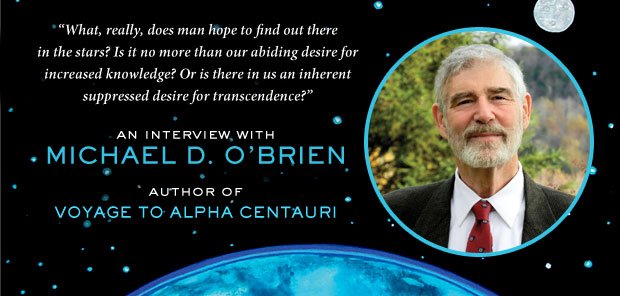
Michael D. O’Brien is the author of several novels, with his latest work, Voyage to Alpha Centauri, taking his tally to ten. We were able to nab the busy author and artist for an interview to give us a peek into his first-ever sci-fi novel, his writing process, and more. Fans and new readers, grab a warm beverage and get to know the best-selling author of Father Elijah, Eclipse of the Sun, and Island of the World!
You’re well known around the world for your novels, many of which grapple with the weighty issues facing our society today. But now you’re writing science fiction. Is that much of a departure from your other work?
O’Brien: Yes, it’s a radical departure from my other nine novels. For many years I’ve been fascinated by the immensity and beauty of the universe, dabbled in astronomy, and often yearned to go “out there,” as impossible as that is. Over the years I’ve pondered these desires and have come to some conclusions about them. Science fiction offers a kind of psychological stepping outside our normal perceptions and categories of thought. We can look at human nature, I think, I hope, with a shade more objectivity. All true cultural works do this in a sense, but sci-fi offers a means to step very far indeed.
From Fahrenheit 451 to Brave New World to 1984, not to mention C.S. Lewis’s Space Trilogy, science fiction has often been a vehicle to express concerns about the direction our world could be headed, often in quite a prophetic way. What themes do you think crop up in Voyage to Alpha Centauri that pertain to some of the directions our society is heading?
O’Brien: There are several. I have worked into the narrative, as the background of the lives of the voyageurs, the condition of Earth about a hundred years from now. Mankind is ruled by “totalitarianism with a friendly face,” a world government that controls more or less everything; technology is rewarding and omnipresent, surveillance is sophisticated and subtle; all sexual morality has been relativized, depopulation laws are draconian, sterility is highly rewarded, fertility is punished, etc. , etc. Green is good, organized religion is bad. The social matrix appears to be peaceful and “democratic” and yet there is very limited personal freedom.
So, Voyage to Alpha Centauri is a kind of anti-utopia or a dystopia?
O’Brien: It’s not merely a dystopian novel in the social and political sense. It also asks metaphysical questions: For example, what is it in human nature that compels us to look beyond the purely material? The scientists and other staff on the ship are the best and brightest of mankind, and along with their strengths they bring their weaknesses and blindness with them on the voyage. What are they seeking when they yearn to escape gravity, escape our planet and our solar neighborhood? What, really, does man hope to find out there in the stars? Is it no more than our abiding desire for increased knowledge? Or is there in us an inherent suppressed desire for transcendence?
Who are your favorite science fiction authors?
O’Brien: Strange to say, I don’t read much science fiction. I recall devouring the novels of Robert Heinlein and Arthur C. Clarke during my early teens, a little Ray Bradbury too, but I gradually lost interest in the field. As an adult reader, I was intrigued by C. S. Lewis’s space trilogy, because he attempted to create a fascinating cosmology with strong emphasis on metaphysical and moral questions. For the most part I found him to be right on the mark in terms of the “war in the heavens.” However, the trilogy suffers from what Tolkien also sensed about it—that it was flawed by the author’s unacknowledged, subconscious dualism. I still dip into science fiction from time to time just to see what kinds of questions are being examined, but find myself constantly disappointed. Most contemporary sci-fi authors raise moral and prudential questions about technology, for example—and rightly so—but they take it for granted that sexual immorality is simply normal and that violence (combined with technological powers) is a natural solution to complex social problems. One of the interesting developments in sc-fi as a whole is the growing preoccupation with distorted supernatural elements. As G. K. Chesterton once pointed out, when men cease to believe in God they do not thereafter believe in nothing. Rather, they will then begin to believe in anything. The human person is, in part, a spiritual being, and when the dimension of the authentic spiritual is denied, a void opens within himself. He then cannot help but seek alternative “spiritualities”—even spiritualities disguised as scientific rationalism.
You’re a prolific novelist as well as a prolific painter—what is your creative process like?
O’Brien: Prayer and self-discipline are the foundation of everything I do. Most often, the origins of a novel or a painting will appear during prayer, sometimes while I’m praying before the exposed Blessed Sacrament. I ponder it in the heart, listening interiorly, thinking about it too. Then if there is a strong peace and an inner sense of “rightness”, I begin giving a form to the essential “word” or logos that came with the light or grace. One can call it inspiration or the muses. But it is, I believe, the phenomenon of co-creation, grace and nature working together to bring into the world something that hasn’t been seen before. God-willing, it will be a work of truth and beauty. Thus the need to be constantly praying and at the same time working hard to develop the skills of writing and painting—all within the understanding that it is a vocation, a gift, not my personal possession. In terms of the process itself, for me a novel or a painting usually just pours out onto page or canvas as the first stage. Then comes the long painstaking work of editing, revising, pruning, listening carefully to feedback from discerning readers of my manuscript, and always self-honesty. It may take me a year to write a first draft of a novel, followed by years of editing. In some of my books, it has taken two or three years. With The Father’s Tale, for example, I began writing it in 1998, and was still refining it ten years later. With Voyage to Alpha Centauri, the process has taken three or four years.
What role do you think the arts play in influencing cultural change?
O’Brien: One need only think of the effects of Orwell’s 1984 or Solzhenitsyn’s Cancer Ward. The arts are absolutely crucial to man knowing himself, knowing his true Story, his greatness and his follies. The mind and heart are expanded as the reader (or listener to great music, etc.) apprehends dimensions of his inner life that so often lie dormant in a horizontal society dominated by materialism, by pragmatism and a vast array of tragically stunted definitions of what it means to be human. The arts can awaken his soul in a way that theory cannot. Thus, the artist’s responsibility before God and man: He can assist in the formation of a truly human society or he will, alternatively, be an instrument of its deformation.
We have some aspiring writers reading this blog. If you had one piece of advice for them, what would that be?
O’Brien: Pray every day to the Holy Spirit, asking for the grace of docility to His inspirations. And continue to pray as you work, pray for the good of the art you are creating and its fruitfulness in the lives of others. Work hard, with self-discipline, to perfect your talent. And avoid any ambition or impulse to manipulate your own “success” in the world—it is absolute poison. Let grace work with your nature, and trust in this. Above all, trust!
Do you have another novel in the works?
O’Brien: I have two novels mapped out, but in a very loaded life I’m waiting for the time and an inner “yes” from God to begin. One is a sequel to my novel Father Elijah, the other…well, I don’t want to give it away too soon.
Where else can readers find you online?
O’Brien: I have a website which presents my paintings and writings. Its address is www.studiobrien.com.
For your readers who are aspiring writers, may I suggest they have a look at my open letter to fellow artists and writers, via this link.






Ellen Tierney
November 21, 2013 at 11:19 am
Bishop Sheen stated God never said there was life on other planets but never said there wasn’t either!
What do you think ?